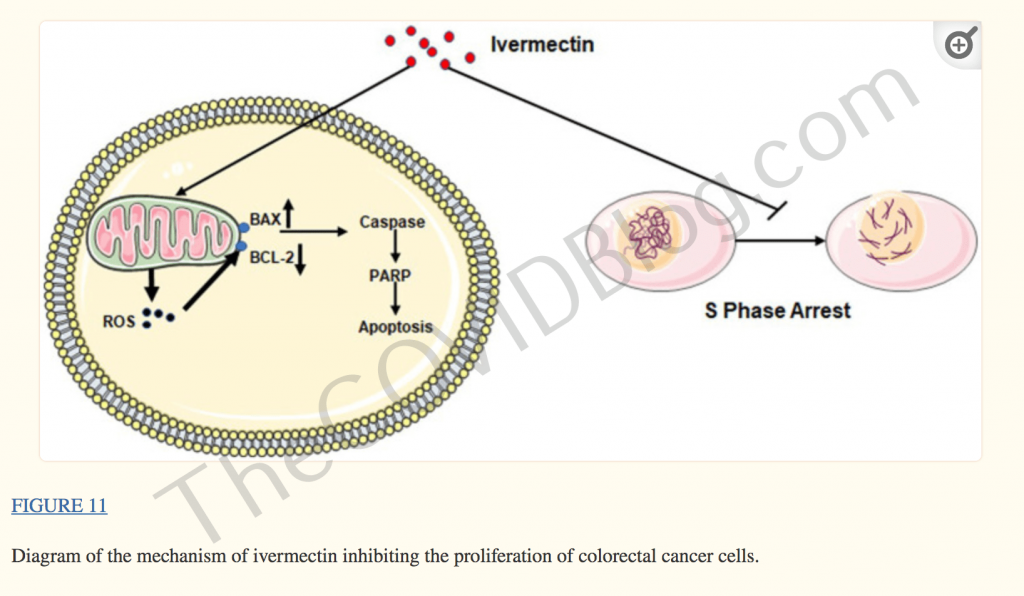Truth Bombshell: 9 peer-reviewed studies conclude that Ivermectin is a powerful, highly-effective anti-cancer drug
April 11, 2022 admin
TheCOVIDBlog.com
April 11, 2022

We know that SARS-CoV-2 is a man-made “paravirus” if you will, created in Wuhan/Moderna laboratories and reinforced by mainstream media propaganda. But in the grand scheme, at least the first iteration released onto the world, so-called COVID-19 is a lightweight illness that is mostly just rebranded influenza.
The mRNA and viral vector injections, along with Remdesivir, combine for a quick two-year, $200 billion global racket for big pharma and Bill Gates. Ivermectin is a proven, powerful drug to treat and prevent so-called COVID-19, according to 108 peer-reviewed studies. The Ivermectin Merck patents are long expired. So the cheap, $1-per-dose, Nobel Prize-winning drug poses a serious threat not only to the emergency use authorizations for the lethal injections, but also to the temporary COVID-19 racket. But those simply cannot be the only reasons for the persistent, petulant, childish mainstream media anti-Ivermectin propaganda.
The cancer industry will surpass $522 billion per year by 2028, according to Global Market Insights. Market analytics firm Precedent Research predicts the cancer industrial complex will surpass $581 billion annually by 2030. The COVID Blog has chronicled the strong correlation (perhaps causal relationship) between mRNA injections and cancer. Cancer has been a goldmine for big pharma since the 1960s. The average cancer patient is worth about $160,000 to the cancer industrial complex. Big pharma will never offer a cure, nor will the industry allow off-label, cheap, effective cancer treatments.
has chronicled the strong correlation (perhaps causal relationship) between mRNA injections and cancer. Cancer has been a goldmine for big pharma since the 1960s. The average cancer patient is worth about $160,000 to the cancer industrial complex. Big pharma will never offer a cure, nor will the industry allow off-label, cheap, effective cancer treatments.
This blogger has seen scattered studies concluding that Ivermectin not only inhibits cancer cell growth, but also kills cancer cells. Perhaps placing nine said studies into one article can help disrupt the cancer industrial complex and wake up the snoozing masses.
Read the full study here.

Read the full study here.
Read more here.
https://thecovidblog.com/2022/04/11/truth-bombshell-9-peer-reviewed-studies-conclude-that-ivermectin-is-a-powerful-highly-effective-anti-cancer-drug/?utm_source=April+11+2022
Thanks to: https://thecovidblog.com
April 11, 2022 admin
TheCOVIDBlog.com
April 11, 2022

We know that SARS-CoV-2 is a man-made “paravirus” if you will, created in Wuhan/Moderna laboratories and reinforced by mainstream media propaganda. But in the grand scheme, at least the first iteration released onto the world, so-called COVID-19 is a lightweight illness that is mostly just rebranded influenza.
The mRNA and viral vector injections, along with Remdesivir, combine for a quick two-year, $200 billion global racket for big pharma and Bill Gates. Ivermectin is a proven, powerful drug to treat and prevent so-called COVID-19, according to 108 peer-reviewed studies. The Ivermectin Merck patents are long expired. So the cheap, $1-per-dose, Nobel Prize-winning drug poses a serious threat not only to the emergency use authorizations for the lethal injections, but also to the temporary COVID-19 racket. But those simply cannot be the only reasons for the persistent, petulant, childish mainstream media anti-Ivermectin propaganda.
The cancer industry will surpass $522 billion per year by 2028, according to Global Market Insights. Market analytics firm Precedent Research predicts the cancer industrial complex will surpass $581 billion annually by 2030. The COVID Blog
This blogger has seen scattered studies concluding that Ivermectin not only inhibits cancer cell growth, but also kills cancer cells. Perhaps placing nine said studies into one article can help disrupt the cancer industrial complex and wake up the snoozing masses.
1) American Journal of Cancer Research – 2018
This study by researchers at Unidad de Investigación Biomédica en Cáncer in Mexico concluded:Read the full study here.So far, at least 235 clinically-approved, non-cancer drugs have proven anti-tumor activity either in vitro, in vivo, or even clinically. Among these, ivermectin, an anti-parasitic compound of wide use in veterinary and human medicine, is clearly a strong candidate for repositioning, based on the fact that:
i) it is very safe, causing almost no side-effects other than those caused by the immune and inflammatory responses against the parasite in infected patients, and
ii) it has proven anti-tumor activity in pre-clinical studies. On the other hand, it is now evident that the use of very selective “unitargeted” drugs is commonly associated to early development of resistance by cancer cells, hence the use of “dirty” or “multitargeted” drugs is important to explore.
2) Pharmacological Research – 2020
Some key findings by Chinese researchers at Bengbu Medical College include the following:- Recent studies have also found that Ivermectin (IVM) could promote the death of tumor cells by regulating the tumor micro-environment in breast cancer.
- In an experiment designed to screen potential drugs for the treatment of leukemia, IVM preferentially killed leukemia cells at low concentrations without affecting normal hematopoietic cells.
- In a study by Hashimoto, it found that IVM inhibited the proliferation of various ovarian cancer cell lines.
- Experiments confirmed that IVM could significantly inhibit the proliferation of five renal cell carcinoma cell lines without affecting the proliferation of normal kidney cells, and its mechanism may be related to the induction of mitochondrial dysfunction.
Read the full study here.
3) Frontiers in Pharmacology – 2021
Researchers at Henan University in China concluded:We have demonstrated that ivermectin may regulate the expression of crucial molecules Caspase-3, Bax, Bcl-2, PARP, and Cleaved-PARP in the apoptosis pathway by increasing ROS production and inhibiting the cell cycle in the S phase to inhibit colorectal cancer cells (Figure 11). Therefore, current results indicate that ivermectin might be a new potential anticancer drug for treating human colorectal cancer and other cancers.

Read the full study here.
4) Molecular Medicine Reports – 2018
Researchers at the National Cancer Institute in Mexico City concluded the following:Read the full study here.Results from the present study demonstrated that ivermectin preferentially targeted the stem cell population in MDA–MB–231 human breast cancer cells. Ivermectin has been demonstrated to be safe, following treatment of millions of patients with onchocerciasis and other parasitic diseases, which makes it a strong candidate for further studies investigating its potential use as a repurposed drug for cancer therapy.
5) Biochemical and Biophysical Research Communications – 2017
Some key findings from researchers at The Second Clinical Medical College in China:- Ivermectin is preferentially against renal cell carcinoma (RCC) while sparing normal kidney cells.
- RCC tumor growth in vivo is delayed by Ivermectin.
- Ivermectin induces mitochondrial dysfunction and oxidative stress.
- RCC has increased mitochondrial biogenesis than normal kidney cells.
Read more here.
6) EPMA Journal – 2020
Researchers at three Chinese institutions concluded:Read the full study here.Those findings provided the potential targeted lncRNA-EIF4A3-mRNA pathways of ivermectin in ovarian cancer, and constructed the effective prognostic model, which benefits discovery of novel mechanism of ivermectin to suppress ovarian cancer cells, and the ivermectin-related molecule-panel changes benefit for its personalized drug therapy and prognostic assessment towards its predictive, preventive, and personalized medicine (PPPM) in ovarian cancers.
7) BMC Cancer – 2021
Chinese researchers at Henan University, concluded the following:Read the full study here.We demonstrated that ivermectin effectively inhibit the proliferation of esophageal squamous cell carcinoma (ESCC) cells by inducing mitochondrial dysfunction, suppressing NF-κB signaling and promoting apoptosis. Our results suggest that ivermectin may be a potential therapeutic target against ESCC.
8) Cancer Chemotherapy and Pharmacology – 2020
Some key findings from researchers at Instituto Nacional de Cancerologia in Mexico City:Read more here.Ivermectin reduced both cell viability and colony formation capacity in the stem cell-enriched population as compared with the parental one. Finally, in tumor-bearing mice ivermectin successfully reduced both tumor size and weight. Our results on the anti-tumor effects of ivermectin support its clinical testing.
9) EMBO Molecular Medicine – 2014
Some key findings by University of Geneva researchers are as follows:Read the full study here.Constitutive activation of canonical WNT-TCF signaling is implicated in multiple diseases, including intestine and lung cancers, but there are no WNT-TCF antagonists in clinical use. We report that Ivermectin inhibits the expression of WNT-TCF targets, mimicking dnTCF, and that its low concentration effects are rescued by direct activation by TCFVP16.
In vivo, Ivermectin selectively inhibits TCF-dependent, but not TCF-independent, xenograft growth without obvious side effects. Given that Ivermectin is a safe anti-parasitic agent used by 200 million people against river blindness, our results suggest its additional use as a therapeutic WNT-TCF pathway response blocker to treat WNT-TCF-dependent diseases including multiple cancers.
https://thecovidblog.com/2022/04/11/truth-bombshell-9-peer-reviewed-studies-conclude-that-ivermectin-is-a-powerful-highly-effective-anti-cancer-drug/?utm_source=April+11+2022
Thanks to: https://thecovidblog.com






 Sat Mar 23, 2024 11:33 pm by globalturbo
Sat Mar 23, 2024 11:33 pm by globalturbo

